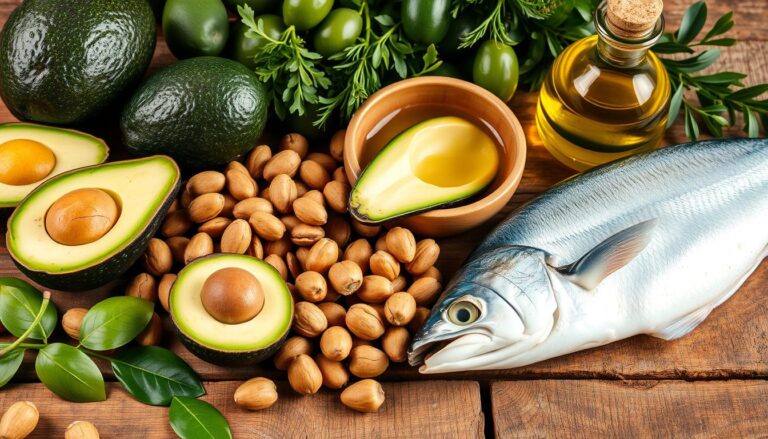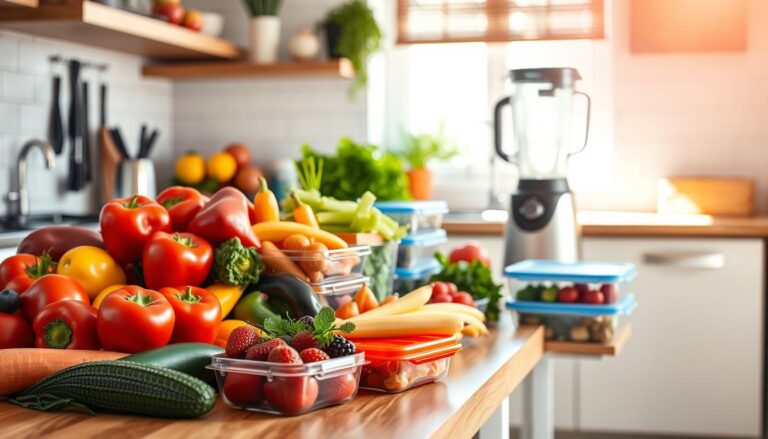Can certain foods help your body target harmful belly fat? Excess belly fat is more than just a cosmetic issue. It’s a serious health concern.
Visceral fat the dangerous type around internal organs increases risks for diabetes heart disease and metabolic disorders.
For women a waist over 35 inches is a warning sign. What if specific foods could change this risk?
Visceral fat is different from subcutaneous fat the layer under skin. While both are important, visceral fat poses a bigger health threat. This article shares science backed foods that target belly fat through metabolic and digestive ways.
Learn how nutrients like omega-3s and soluble fiber can improve health and reduce waistlines.
Key Takeaways
- Visceral fat increases disease risk more than surface fat.
- Omega-3s in fatty fish may reduce dangerous abdominal fat deposits.
- Probiotics improve gut health to support metabolic balance.
- Soluble fiber slows digestion and reduces calorie absorption.
- Combining these foods with mindful eating creates sustainable change.
Understanding Belly Fat and Why It’s Difficult to Lose

Abdominal fat is more than just a beauty issue. It’s tied to deep biological processes. Visceral fat found deep in the belly is riskier than subcutaneous fat. It releases chemicals that can lead to diabetes heart disease and other health problems.
Subcutaneous fat on the other hand, is less harmful but harder to lose with just spot exercises. It’s found just under the skin.
The Difference Between Visceral and Subcutaneous Fat
Visceral fat wraps around vital organs and causes inflammation. It makes up only 10% of body fat but has big health impacts. Subcutaneous fat, making up 85% of body fat, is less risky but harder to target with exercises alone.
Genetics and hormonal changes, like those during menopause can make visceral fat worse. As we age, we lose muscle which slows down our metabolism. This makes it harder to keep weight off. Stress also plays a role as it increases cortisol a hormone that adds to belly fat.
Even with a healthy weight, too much visceral fat is a health risk. Waist size is a better indicator of health than BMI. To lose belly fat, you need to make lasting lifestyle changes. This includes strength training HIIT and eating foods high in fiber protein and healthy fats.
Focus on building long-term habits not quick fixes. This approach aligns with medical advice for safe and lasting results.
How Diet Specificially Targets Abdominal Fat
The best diet for losing belly fat focuses on certain nutrients. These nutrients help control hormones and metabolism. Soluble fiber found in oats apples and beans slows digestion and cuts down calorie absorption.
This fiber also feeds the good bacteria in our gut. It improves how our body handles insulin and reduces fat storage around the belly.
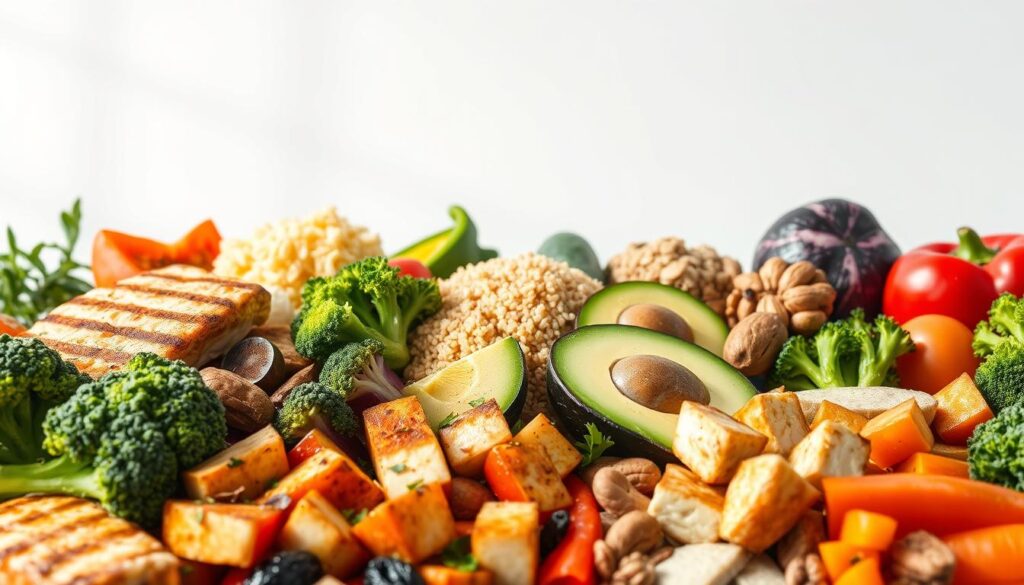
Read more: 7 Drinks to Burn Belly Fat
Protein rich foods like quinoa and Greek yogurt boost our metabolism. High protein meals make our body burn more calories while we digest. Chicken breast and fish are good sources of lean protein helping us lose fat without losing muscle.
- Soluble fiber in flaxseeds and avocados helps with fat metabolism by binding to cholesterol.
- Omega-3s in salmon and walnuts reduce inflammation which is linked to belly fat storage.
- Anti-inflammatory spices like cinnamon help stabilize blood sugar preventing fat retention caused by cortisol.
Healthy fats like olive oil and nuts help balance hunger hormones, preventing overeating. Green tea’s catechins and capsaicum in chili peppers temporarily boost our metabolic rate. Combining these with staying hydrated and moderate exercise makes for a lasting plan to lose belly fat.
Top 10 Foods to Eat to Lose Belly Fat Fast
Research shows certain effective foods for losing belly fat through their nutrient profiles. These foods boost metabolism and reduce fat storage. They are linked to less abdominal fat and better metabolic health.
- Green Tea It has catechins that increase metabolic rate and fat burning. Studies show it can burn up to 4% more calories daily.
- Avocado It has monounsaturated fats and fiber. These improve insulin sensitivity, helping to reduce belly fat.
- Wild Caught Salmon Omega-3s in it reduce inflammation linked to belly fat.
- Almonds They are high in protein and fiber. This helps control hunger and calories.
- Cruciferous Vegetables Broccoli and kale have compounds that control fat growth.
- Chili Peppers Capsaicin in them increases calorie burning after meals.
- Plain Greek Yogurt It’s high in protein which helps feel full and keeps muscle during dieting.
- Chia Seeds They have soluble fiber that slows down sugar absorption, keeping blood sugar stable.
- Dark Chocolate 70%+ cocoa Flavonoids in it lower cortisol levels, helping reduce belly fat from stress.
- Edamame It’s a plant-based protein that improves metabolism over refined carbs.
Scientific Evidence Supporting These Food Choices
A 2021 study in the Journal of Nutrition found avocado eaters had 23% less belly fat than non eaters. Green tea polyphenols increased energy expenditure by 4-5% in trials. Omega-3s from fatty fish also reduced waist size in clinical trials.
| Food | Key Nutrients | Mechanism of Action |
|---|---|---|
| Green Tea | Cateechin EGCG | Inhibits fat absorption and enhances lipolysis |
| Avocado | Oleic acid fiber | Regulates leptin signaling and insulin sensitivity |
| Salmon | EPA/DHA Omega-3s | Reduces inflammatory cytokines promoting fat storage |
| Almonds | L-arginine, vitamin E | Enhances fat oxidation during exercise |
| Broccoli | Indole-3-carbinol | Activates adiponectin improving fatty acid metabolism |
https://www.youtube.com/watch?v=8NRtHJqwuGA
These foods that promote abdominal fat loss work well together in balanced diets. Studies show adding these foods to workouts can increase fat loss by 30-40% more than dieting alone.
Lean Proteins That Combat Belly Bulge
Lean proteins are key to losing belly fat. Fish with omega-3 fatty acids are great for both your health and fat loss. They help keep muscle mass and fight inflammation that leads to belly fat.
Fish Rich in Omega-3 Fatty Acids
Fatty fish like salmon mackerel and herring target belly fat. Studies show omega-3s lower liver fat and improve insulin sensitivity. This is important for losing belly fat.
A study found omega-3 supplements helped people with fatty liver disease lose belly fat. This shows how effective omega-3s can be.
| Fish Type | Omega-3 Content grams per 3-oz serving |
|---|---|
| Salmon | 1.8 |
| Mackerel | 1.4 |
| Herring | 1.7 |
Eat these fish 2–3 times a week. Choose wild-caught salmon or sardines in water to avoid too much salt. Grilling or baking is better than frying to keep omega-3s intact.
- Salmon Contains astaxanthin, an antioxidant that enhances metabolic function
- Sardines High in vitamin D to regulate appetite hormones
- Herring Low mercury content compared to larger fish
Plant-based options like chickpeas and peanuts also help. A 2022 study showed people who ate chickpeas regularly had smaller waists. For vegetarians algae based omega-3 supplements are a good choice.
Protein distribution across meals maximizes fat-burning says Dr. Emily Carter of the Nutrition Institute. Pair fish with vegetables for a complete belly fat burning meal.
Always choose wild-caught fish and vary your sources to avoid toxins. Eating these foods with regular exercise boosts results. Exercise helps your body absorb omega-3s better and increases your metabolism.
Fiber Rich Foods That Flatten Your Stomach
Soluble fiber slows digestion and makes you feel full, which helps control belly fat. Foods high in this fiber keep blood sugar stable and reduce fat around the belly. Studies show eating 10g more soluble fiber each day can lead to a 3.7% drop in belly fat over five years.
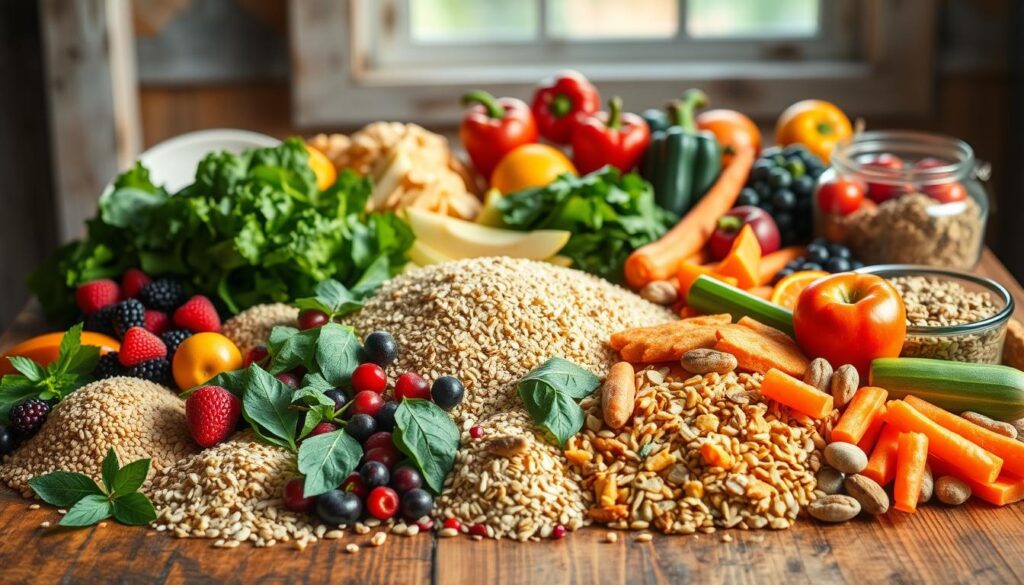
Read more: How Vegetarians Heal Their Gut and Digestion
- Apples 4g fiber each slow digestion and curb overeating.
- Oats 4g per cup contain beta glucan a soluble fiber that makes you feel full.
- Legumes like lentils 15g per cup give you energy and reduce hunger.
- Chia seeds 5g per tablespoon absorb water making you feel full.
- Cruciferous vegetables broccoli kale are high in fiber and low in calories helping your metabolism.
For every 10g rise in soluble fiber intake, visceral fat accumulation decreased by 3.7% in a 5-year study of 1,100 adults.
Start adding these foods slowly to avoid stomach upset. Aim for 25–38g of fiber a day focusing on soluble types. Drinking water helps your gut move food better. Berries, artichokes and pears also help your gut health, reducing inflammation that leads to belly fat.
Healthy Fats That Actually Help Reduce Abdominal Fat
Not all fats are the same when it comes to losing belly fat. The best diet includes healthy fats that boost metabolism and lower inflammation. Foods like avocados and nuts have monounsaturated and polyunsaturated fats. These fats help fight belly fat storage.
Avocados and Their Belly-Targeting Benefits
Avocados are full of monounsaturated fats MUFA that help with insulin sensitivity and reduce inflammation. A 2013 study showed that eating avocados regularly can cut the risk of metabolic syndrome by half. This condition is linked to too much belly fat. Avocados also have fiber and phytosterols that help keep blood sugar stable, preventing overeating.
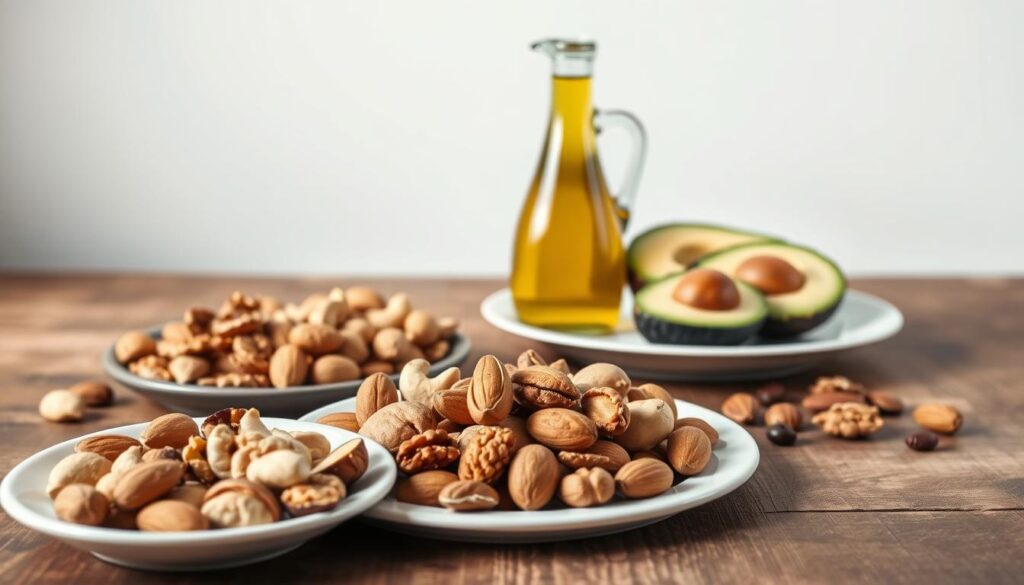
Read more: Eat Plants Balance Blood Sugar Lose Weight
- Olive oil Rich in MUFA it reduces visceral fat when used as a cooking substitute for saturated fats.
- Nuts and seeds Omega-3 fatty acids in walnuts and flaxseeds enhance fat metabolism and curb hunger.
- Fatty fish Salmon and tuna provide EPA/DHA, omega-3s that reduce inflammatory markers tied to belly fat.
Remember portion control is important. While these fats help with belly fat loss they are high in calories. Eat them with high fiber foods to get the most fat burning benefits. Focusing on these nutrients helps maintain metabolic health without cutting calories too much.
Anti Inflammatory Foods That Shrink Your Waistline
Chronic inflammation leads to belly fat. Eating anti-inflammatory foods is key to losing fat. These effective foods for losing belly fat lower harmful markers and improve health.
| Food | Active Compounds | Benefits |
|---|---|---|
| Salmon | Omega-3 fatty acids | Reduces visceral fat and lowers CRP levels |
| Blueberries | Anthocyanins | Protect against obesity-linked inflammation |
| Extra virgin olive oil | Oleocanthal | Inhibits pro inflammatory enzymes |
| Walnuts | Alpha linolenic acid | Supports weight management and insulin sensitivity |
| Turmeric | Curcumin | Blocks inflammatory pathways and improves lipid profiles |
Green tea’s EGCG targets fat cells and boosts metabolism. A 2019 study in Obesity Reviews showed green tea helps reduce belly fat by 1.4% more than placebo.
Cortisol-induced inflammation creates a cycle where stress drives fat storage and hunger hormones. Combating this with anti-inflammatory foods disrupts this cycle.
Add walnuts and olive oil to salads, turmeric to soups, or blueberries to smoothies. These foods follow the Mediterranean diet, which can reduce waist size by 2.3 inches in two years. Combining these foods with stress-reduction practices boosts their benefits.
Metabolism Boosting Spices and Herbs
Spices and herbs can boost your metabolism and target belly fat. They contain bioactive compounds that help burn calories and improve insulin function. These ingredients are key in foods that promote abdominal fat loss.
Cayenne Pepper and Capsaicin Effects
Cayenne pepper has capsaicin which raises your metabolic rate and reduces hunger. Studies show capsaicin activates brown fat increasing energy use for up to 3 hours. Using it regularly can help reduce fat over time.
| Spice | Active Compound | Benefits | Usage |
|---|---|---|---|
| Cinnamon | Polyphenols | Stabilizes blood sugar reduces insulin spikes | Sprinkle on oatmeal yogurt or coffee |
| Turmeric | Curcumin | Boosts fat oxidation and reduces inflammation | Add to soups roasted veggies or smoothies |
| Ginger | Gingerol | Enhances calorie burn and reduces appetite | Grate into stir fries teas or salad dressings |
| Black Pepper | Piperine | Inhibits fat cell formation | Season yogurt eggs or rice dishes |
| Cumin | Essential oils | Reduces body fat storage | Use in chili soups or grain dishes |
| Fenugreek | Saponins | Lowers appetite and food intake | Drink as tea or add to smoothies |
| Cardamom | Volatile oils | Boosts thermogenesis | Blend into curry or herbal tea |
| Garlic | Alliin | Increases fat metabolism | Sauté with vegetables or add to marinades |
Add these spices to your meals to boost their effects. For the best results combine them with a balanced diet and exercise. Even small amounts used regularly can help with foods that promote abdominal fat loss.
Sample Meal Plan Incorporating Belly Fat Burning Foods
A structured meal plan helps you eat right to lose belly fat. Here’s a 7-day plan with foods that are good for your metabolism.
- Day 1:
- Breakfast Scrambled eggs with spinach tomato and whole grain toast 350 cal
- Lunch Tuna salad with lettuce cucumber and olive oil dressing 400 cal
- Snack Apple slices with 1 tbsp peanut butter 150 cal
- Dinner Bean chili with cauliflower rice and mixed veggies 450 cal
- Day 2:
- Breakfast Oatmeal with blueberries chia seeds and almond milk 300 cal
- Lunch Hummus wrap with veggies and whole wheat tortilla 420 cal
- Snack Tangerine and 10 cashew nuts 120 cal
- Dinner Baked salmon with roasted veggies and quinoa 480 cal
- Day 3:
- Breakfast: Avocado mash on rye toast with a fried egg 380 cal
- Lunch: Chicken stir-fry with soba noodles and broccoli 410 cal
- Snack: Greek yogurt with raspberries and ¼ cup walnuts 200 cal
- Dinner: Guacamole chopped salad with grilled chicken 450 cal
Each day’s meals add up to 1,200–1,300 calories. To hit 1,500 or 2,000 calories add almonds extra avocado or yogurt. Storage tip Keep meals in airtight containers and use silicone molds for overnight oats.
Drink plenty of water or herbal teas instead of sugary drinks to help lose fat.
These meals focus on lean proteins healthy fats and fiber. They help keep your energy up while working on losing belly fat. Feel free to adjust based on your taste preferences but keep the nutrients high.
Conclusion Creating Sustainable Habits for Long Term Belly Fat Management
To keep belly fat off for good, you need a solid plan. Eating foods that help with belly fat is just the start. Add in regular exercise and good sleep to really see results.
Try to exercise 3-4 times a week. Mix cardio and strength training to build muscle and burn fat. Getting 7 to 9 hours of sleep each night helps control hunger hormones.
Stress can also add to belly fat. Use meditation to lower cortisol levels. Drinking eight cups of water a day boosts metabolism and digestion.
Keep track of what you eat and how much you move. This helps you stay on track. Choose foods that are full of nutrients to avoid too many calories.
Small changes can make a big difference. Swap junk snacks for healthy options like avocado or nuts. Losing weight too fast is not healthy. Aim for 1-2 pounds a week.
Don’t just look at the number on the scale. Celebrate feeling more energetic or fit. Keeping up with healthy habits takes time and effort. But it’s worth it for better health and well-being.
